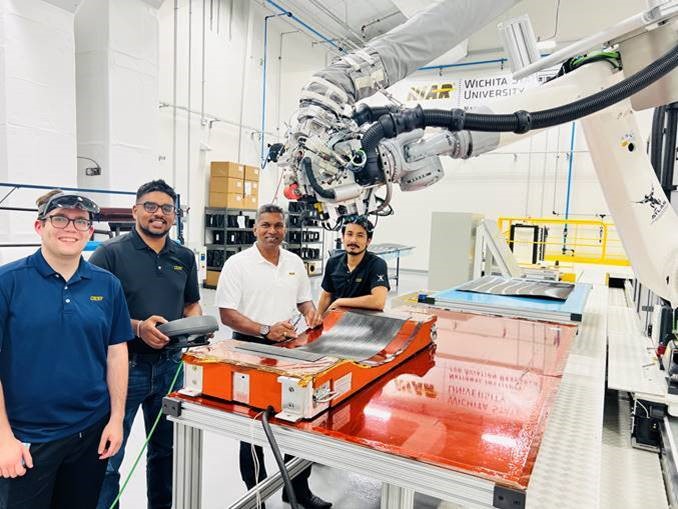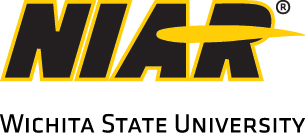
Pictured: Luke Johnson, Tharaka Nandakumara, Waruna Seneviratne, and Sarvesh Shrestha
The In-process AFP Manufacturing Inspection System (IAMIS), developed by the Advanced Technologies Lab for Aerospace Systems (ATLAS) at Wichita State University’s National Institute for Aviation Research (NIAR), is a finalist in the JEC Composites Innovation Awards.
IAMIS attaches to the AFP head and employs machine-learning (ML) algorithms to detect manufacturing defects that are above the certification basis (or unacceptable). IAMIS reduces time-consuming and operator-dependent manual inspection processes that require significantly interruption of the manufacturing process.
When the AFP operation is halted for repairs, IAMIS’ accompanying augmented reality visualization module provides the location and description of each defect, allowing quality inspectors and repair technicians to locate them quickly and accurately. The augmented reality visualization module also enables remote review, allowing for quicker repair and analysis decisions and significantly reducing downtime.
The Office of Naval Research (ONR) funded the development of this system, and the U.S. Air Force Research Lab’s (AFRL) Modeling for Affordable Sustainable Composites research program contributed to the development of calibration and verification standards for quality assurance of aircraft structures using IAMIS.
“Quality assurance through inspections and process controls is essential to ensure that material is laid up and processed according to specification with no process-induced defects,” said Waruna Seneviratne, director of NIAR ATLAS and principal investigator for both ONR and AFRL projects. “Although AFP significantly improves production rates and quality – due to the lack of reliable in-process inspection techniques – AFP processes are interrupted intermittently. These interruptions for manual inspection can account for 20-70 percent of the production time, diminishing the benefits of automation.”
In addition, manual inspection processes have deficiencies such as operator/training/environment/dependencies and inconsistencies. The primary goal of this research is to develop a framework for implementing machine-learning algorithms and artificial intelligence. The benefits are two-fold: 1) improve AFP manufacturing rates by reducing the labor-intensive manual inspection and 2) improve AFP quality through data analytics.
AFP systems require significantly high capital expenditure and infrastructure improvements, and machine utilization is a critical parameter in calculating return on investment. With IAMIS, time-consuming manual inspections that are often operator-dependent can be eliminated; improving the manufacturing efficiency of AFP system and ultimately reducing the total cost of ownership.
“IAMIS is a must-have accessory for improving system utilization,” said Seneviratne. It significantly reduces scrap allowing for energy savings and decreasing per-part cost.”
The JEC Composites Innovation Awards reward cutting-edge, creative projects that demonstrate the full potential of composite materials. Created in 1998, program goals include:
- Identify, promote, and reward the most innovative composite solutions worldwide
- Encourage companies that are involved in composite innovation along with their partners
- And also enhance their public exposure; and contribute to the advancement of the composite industry
The competition is open to any company or R&D Center with a strong collaborative innovation or concept to present. The success of each competitor is closely linked to the partnerships and collective intelligence involved.
About ATLAS
The Advanced Technologies Lab for Aerospace Systems at Wichita State University’s
National Institute for Aviation Research is a multi-disciplinary manufacturing innovation
center for industry-scale automated manufacturing research including high fidelity
inspections, automated fiber placement (AFP), fiber patch placement for complex geometries,
thermoplastic welding, and thermoplastic over-molding for multi-functional integrated
structures. ATLAS prepares engineers and educators for the Factory of the Future,
preparing the workforce for seamless adaption to advancements in the global aerospace
industry.


